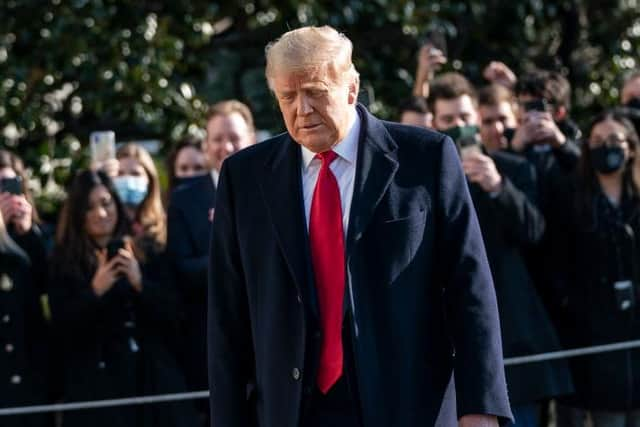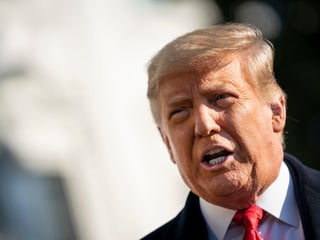How many US presidents have been impeached? Charges against Bill Clinton, Andrew Johnson and Donald Trump explained
Donald Trump became the first US president to be impeached twice, after the House of Representatives voted he had a role in inciting the insurrection on the Capitol.
He has been charged with incitement of insurrection after a group of Trump supporters, protesting the result of the 2020 presidential election, stormed the Capitol building on Wednesday 6 January.
Advertisement
Hide AdAdvertisement
Hide AdHe will see out his presidential term, which ends on 20 January when Joe Biden is sworn in, before facing a trial in the Senate - in which senators can stop Trump from running for president again.


Trump was first impeached in December 2019 for an abuse of power and obstruction of Congress, but remained in office after he was acquitted by the Senate.
But which other presidents in history have been impeached, and have any been disqualified?
How many presidents have been impeached?
US history shows impeachment is rare, with three presidents in total having faced it - Andrew Johnson, Bill Clinton and Donald Trump.
Neither Johnson nor Clinton was removed from power, though both parties lost the next presidential election.
In order to have been impeached, a president or any other federal official, must have committed an act of "treason, bribery, or other high crimes and misdemeanors", as described by the Constitution.
To be impeached by the House is the first of a two-step process to remove a president from office.
Once the House has passed articles of impeachment, formally accusing the official of misdemeanour, the Senate holds a trial.
Advertisement
Hide AdAdvertisement
Hide AdThe Senate, the upper house of the US Congress, has acquitted all three cases in the past.
Andrew Johnson
In the wake of the Civil War, president Andrew Johnson repeatedly clashed with the Republican-controlled Congress over reconstruction of the defeated South.
It resulted in the House voting on 24 February 1868 to impeach Johnson.
Though the Republican party held more than a two thirds majority required to remove Johnson from office, he was acquitted after a sufficient minority wished to protect the office of the president.
The trial concluded on 16 May 1868 and Johnson, the 17th president of the United States who assumed power following the assissination of Abraham Lincoln, served out his term, leaving office on 4 March 1869.
Bill Clinton
On 19 December 1998, president Bill Clinton was charged with lying under oath to a federal grand jury and obstructing justice by the House.
While in office, Clinton had denied having "sexual relations" with a former White House intern Monica Lewinsky to federal investigators and the public.
He was acquitted on both counts by the Senate, neither obtaining the two-thirds majority required, on 12 February 1999. Though many Senators believed he had behaved badly the misconduct wasn't deemed at the level of "high crimes and misdemeanors".
Advertisement
Hide AdAdvertisement
Hide Ad"While many Senators agreed that Clinton had behaved badly, they ultimately decided that his misconduct wasn’t at the level of “high crimes and misdemeanors."
Clinton, the 42nd president of the US, saw out his second term, leaving office on 20 January 2001.
Donald Trump
Trump, the 45th president of the US, was impeached for an abuse of power and obstruction of Congress on 18 December 2019 by the House.
This stemmed from a phone call Trump made to the president of Ukraine, Volodymyr Zelensky, encouraging him to dig up dirt on political rival Joe Biden and his son Hunter.
Biden jr worked for a Ukranian energy company when his father was US vice president under Barack Obama.
Trump's administration was accused of withholding military aid from Ukraine at around that time and a White House meeting for Zelensky.
The House's judiciary committee said Trump had "betrayed the nation by abusing his high office to enlist a foreign power in corrupting democratic elections".
But he was acquitted by the Senate on 5 February 2020, on a near party-line vote. Senator Mitt Romney, a Republican from Utah, was the only one to break party ranks.
Advertisement
Hide AdAdvertisement
Hide AdThe attack on the US Capitol on Wednesday 6 January 2021 led to a House vote on whether Trump had any involvement in inciting supporters prior to the riots.
Democrats say he incited supporters to storm the Capitol, which some members of the Republican party agree with, though Trump rejected any responsibility for the violence.
Who was the only president to resign?
Richard Nixon was not impeached, however, the impeachment process against him brought on by the Watergate scandal was the only one to lead to a president's departure from office.
Nixon, elected the 37th president of the United States, announced on 8 August 1974 that he would resign from office the next day to begin "that process of healing which is so desperately needed in America".
His successor, Gerald Ford, pardoned Nixon a month later.
